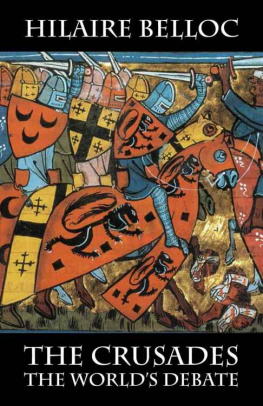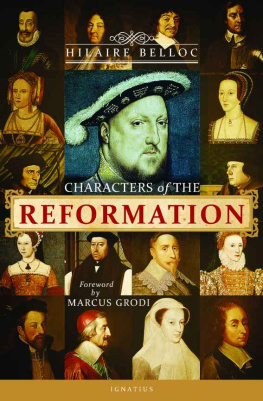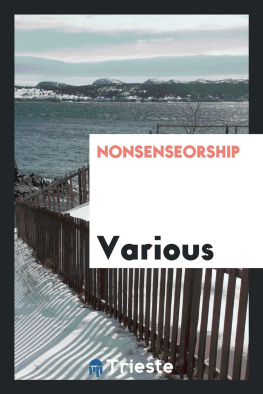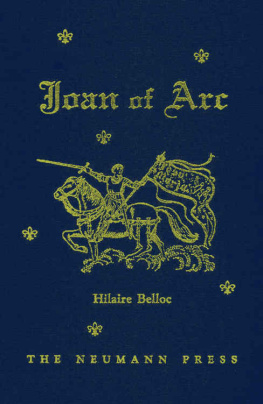INTRODUCTION
The Battle of Poitiers was fought ten years and four weeks after that of Crcy.
The singular similarity between the two actions will be pointed out upon a later page. For the moment it must suffice to point out that Poitiers and Crcy form unique historical parallels, distinguishing like double summits the English successes of Edward III.s army upon the Continent and of the first part of the Hundred Years War.
For the political situation which had produced that conflict, and for the objects which Edward III. had in provoking it, I must refer my reader to the first section of my little book upon Crcy in this series; as also for the armament and organisation of the forces that served the English crown. There remain to be added, however, for the understanding of Poitiers and its campaign, two features which differentiate the fighting of 1356 from that of ten years before. These two features are: first, the character of the commander; and secondly, the nature of the regions from which he started and through which he proceeded, coupled with the political character of the English rule in the South of France. I will take these points in inverse order.
When Calais had fallen and had become an English possession in the summer of 1347 no peace followed. A truce was patched up for some months, followed by further truces. Through the mediation of the Pope a final and definite treaty was sketched, which should terminate the war upon the cession of Aquitaine to Edward III. in full sovereignty. The French Valois king would perhaps have agreed to a settlement which would have preserved his feudal headship, though it would have put the Plantagenets in virtual possession of half France (as France was then defined). But Edward III. would not accept the terms. He had claimed the crown of France. He had won his great victory at Crcy still claiming that crown. He would not be content with adding to his feudal tenures under the French crown. He would add to his sovereignty at least, to his absolute sovereignty, or continue the war. In 1354 (the Black Death intervening) the war was renewed. Edward would have been content, not with the whole of Aquitaine, but with complete sovereignty over the triangle between the Garonne and the Pyrenees in the south, coupled with complete sovereignty over the north-eastern seaboard of France from the Somme to Calais, and inland as far as Arras, and its territory, the Artois. But the French monarchy, though ready to admit feudal encroachments, would not dismember the nominal unity of the kingdom: just as a stickler in our north will grant a 999-year lease, but will not sell.
The result of this breach in the negotiations was that Edward, and his son the Black Prince, entered upon the renewal of the war with a vague claim to Aquitaine as a whole, with an active claim upon Guiennethat is, the territory just north of the Garonneand a real hold upon Gascony; and still preserving at the back of the whole scheme of operations that half-earnest, half-theatrical plan for an Anglo-French monarchy under the house of Plantagenet which had been formulated twenty-five years before.
It must be clearly grasped by the general reader how natural was both the real and the fantastic side of that pursuit. It involved no question of nationality as we should now understand it. It was based upon still living traditions of feudal connections which were personal and not racial; the chivalry of France and England was a French-speaking society based upon common ideals and fed with common memories. Gascony was in favour of the Plantagenets. Further, Guiennethe district north of Gascony beyond the Garonnewas Edwards feudal own. He was not king of it, but he was feudal lord of it, and had done homage for it in 1331 to the Valois. It was not a new or distant tie. For the rest of the quarrel my first section in the essay on Crcy already alluded to must suffice, but for the link with Gascony a more particular emphasis is needed. The trade of Bordeaux, its great town, was principally with British ports. Its export of wine was a trade with Britain. It lay far from the centre of the French monarchy. It had counted in its Basque population an element indifferent for hundreds of years to the national unity of Gaul. The moneyed interests of its great commercial centres, of the western ones, at least (which were by far the richest), were closely bound up with England, with English trade. Add to this his actual feudal tenure of Guienne, and we can see how the feeling that all the south-west corner of France was his grew to be a very real feeling in Edwards mind, and was shared by his son.
When, therefore, upon the 20th September 1355, Edward, the Black Prince, landed at Bordeaux, it was to find a province the nobles of which were honestly attached to his cause and the greater townsmen as well; while in the mass of the people there was no disaffection to the idea of this one out of the vague, many, French-speaking feudal lords whom they knew to be their masters, being the actual governor of the land. There was no conquest, nor any need for it, so far as Gascony was concerned; and in any expedition the Prince might make he was as certain of a regular following from the towns and estates that lay between the mountains and the Garonne as the King of France was certain of his own feudal levies in the north. But expeditions and fighting there would be because the Black Prince came with a commission not only to govern Gascony, but to establish himself in the more doubtful Guienne, and even to beif he could conquer itthe lieutenant of his father, Edward, in all Aquitaine. He was to recover the districts immediately north of the Garonne, and even (in theory, at least) right up to the neighbourhood of the Loire; and (in theory, again) he was to regard those who might resist his administration of all these lost countries of the Central and Southern West of France as rebels.
It was thought certain at first, of course, that the whole claim could never be pushed home; but the Black Prince might well hope so to harry the districts which were claimedand the neighbouring county of Toulouse to the east, which was admittedly feudatory to the King of Parisas to compel that sovereign to recognise at last his fathers absolute sovereignty over Gascony certainly, and perhaps over Guienne, or even somewhat more than Guienne.
The remainder of that year, 1355, thereforethe autumn and the winterwere spent in striking at the sole portion of Gascony that was disaffected (that of Armagnac), and pushing eastward to ravage Toulouse and Carcassonne; for though these towns were admittedly outside Edwards land, the wasting of their territory was a depletion of the King of Frances revenue.














